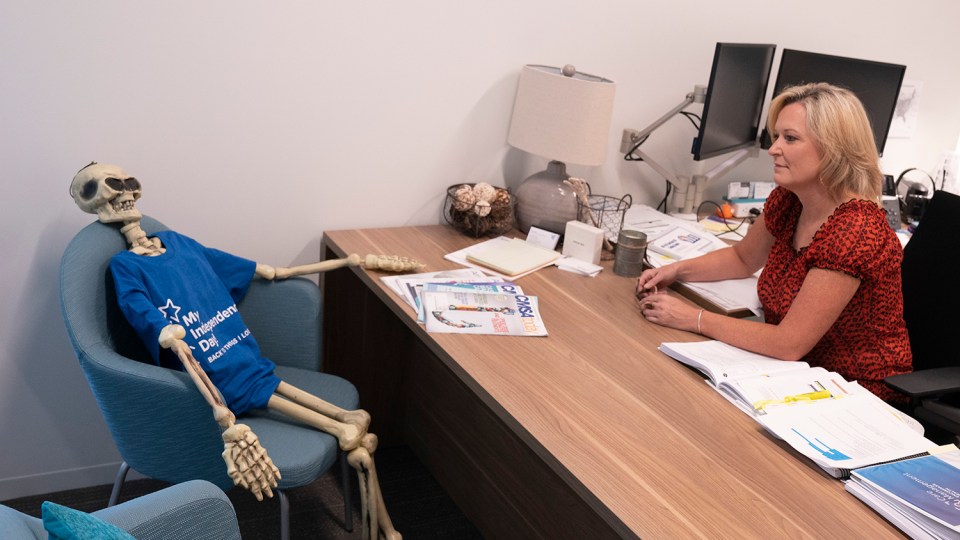They may not be checking your vital signs, listening to your lungs with a stethoscope or providing other types of “hands-on” care to patients, but case managers are a vital part of the patient care team. Case managers play a unique and challenging role; guiding patients and their caregivers through their stay in inpatient rehabilitation, navigating payer constraints and transitioning patients to a home setting after a catastrophic illness or event. A case manager may even coordinate care for a patient after discharge from the hospital.
They also act as a central hub to the interdisciplinary care team; guiding the care team on topics such as discharge preparation, payer limitations or social factors impacting a patient’s stay or a successful discharge.
The work of a case manager begins soon after a patient arrives at an Encompass Health rehabilitation hospital and may continue after they have been discharged. In light of National Case Management Week, Dina Walker, Encompass Health’s national director of case management, shared details about the many important roles a case manager plays in inpatient rehabilitation.
A Jack-of-All-Trades
Case managers at Encompass Health inpatient rehabilitation hospitals are different from those in other care settings like an acute care hospital or home health agency.
Often, in acute care hospitals, the traditional responsibilities of a case manager have been redistributed and divided into more specific roles such as a utilization review nurse, discharge planner or care navigator.
Clinicians, including registered nurses and social workers, historically fill the role of case manager. “At Encompass Health, a single case manger performs all case management functions,” Walker said. A case manager may have a different background or education level. For example, therapists, behavioral health specialists and public health professionals also fulfill the case manager role at Encompass Health.
“Case management, especially in an inpatient rehabilitation hospital, is an advanced practice,” Walker said. “Our case managers come from a variety of healthcare-related settings and backgrounds. They come to us with good core knowledge and we layer on top of that more well-rounded experience and inpatient rehabilitation expertise.”
Case managers should understand all levels of post-acute care so they can help the care team determine the next appropriate care setting when the patient is nearing discharge from the inpatient rehabilitation hospital. “We’re constantly weighing priorities for our patients, making sure the patient is in the right care setting at the right time for the right reason,” Walker said.
In addition, case managers are well versed in insurance coverage, benefits and payment models. The case manager must have that fiscal level of knowledge and experience to balance financial considerations with patient advocacy.
A Moderator and Negotiator
An interdisciplinary approach to patient care means the case manager is coordinating the many care team members involved in that patient’s care. While all clinicians are focused on delivering exceptional patient care, case managers are able to look at the big picture of a patient’s individualized treatment and discharge plan, making sure it meets that patient’s needs, treatment preferences and helps them successfully achieve their goals.
“Our case managers facilitate communication across all the key care disciplines to deliver patient-centered case management services. We are considering the whole person in our planning and also include the patient’s family and support system,” Walker said. “A case manager must be skilled at moderating conversations and negotiating elements of the discharge plan so the patient is more apt to succeed.”
We are considering the whole person in our planning and also include the patient’s family and support system”
Dina Walker
A Detective
By and large, Walker said, “case manages should love solving puzzles”, as investigating all key details of a patient’s care is a significant part of the job.
They usually have some interest in detective work and being a sleuth. “A case manager has to ascertain additional details about a patient, their family dynamics, or their environment in order for the discharge plan to be successful”, Walker says.
“Case managers take tidbits of information from multiple sources and tie it into the bigger, patient-centric picture,” she said. “They also assess what might be missing from the discharge care plan. They have to know the right questions to ask.”
An Advocate
Above all, case managers at Encompass Health are passionate, relentless patient advocates—and that advocacy doesn’t stop when a patient leaves the hospital. Case managers coordinate care and services with community agencies and implement a transition plan to help keep patients safe and progressing after discharge.
“Case managers are passionate about helping patients achieve their health-related goals. They are driven every day to advocate for their patients and their families or caregivers. Through true advocacy, a case manager can really make meaningful strides in helping the patient succeed once they leave our hospital,” Walker said.
The content of this site is for informational purposes only and should not be taken as professional medical advice. Always seek the advice of your physician or other qualified healthcare provider with any questions you may have regarding any medical conditions or treatments.



